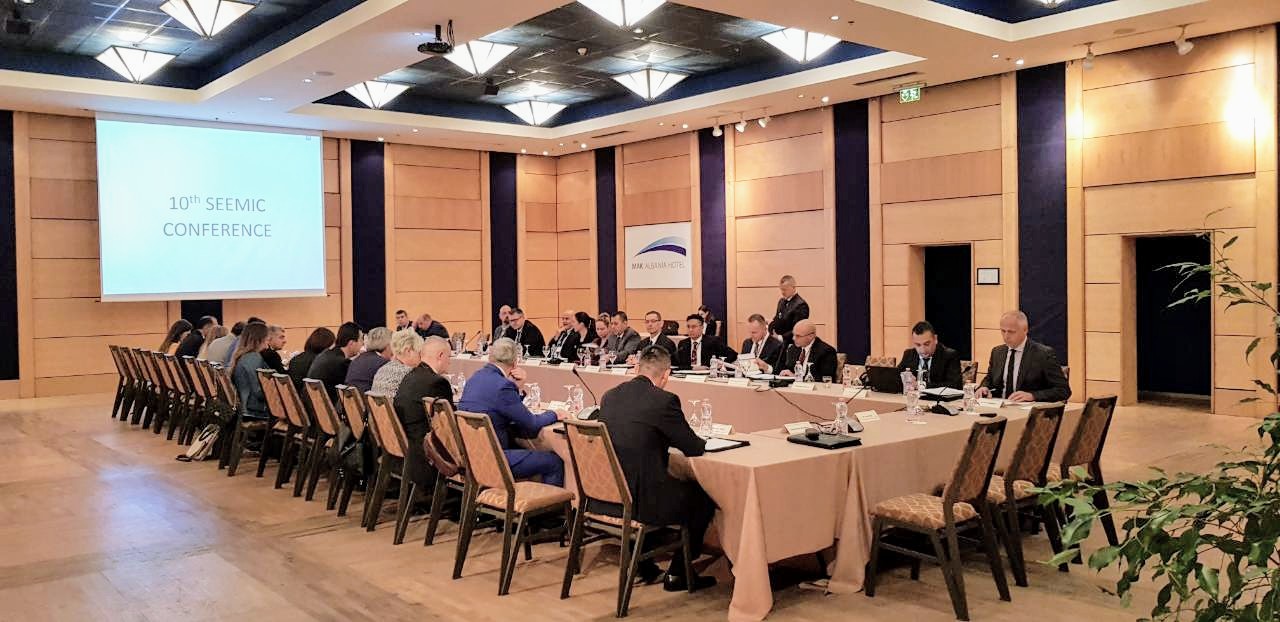Region’s Military Intelligence Chiefs discuss cyber security challenges in the Western Balkans
07 November 2018

10th Conference of the South East European Military Intelligence Chiefs (SEEMIC), in Tirana on 7 November 2018 (Photo:RCC/Natasa Mitrovic)
Tirana – The South East European Military Intelligence Chiefs (SEEMIC) adopted the Open-source intelligence (OSINT) assessment dedicated to ‘Challenges to critical infrastructure cyber security in South East Europe ' at their 10th Conference held on 7 November 2018 in Tirana, Albania. The event was co-organised by the Regional Cooperation Council (RCC) and the Defence Intelligence and Security Agency (DISA) of the Ministry of Defence of Albania.
The adopted OSINT report addresses the issues of cyber-attacks at critical infrastructure, public-private partnership in cybersecurity infrastructure, regional and international nature of cybersecurity, and even more importantly, cybersecurity challenges to military infrastructure as well as the human factor in cybersecurity.
Given the nature of modern hybrid warfare as well as current and projected security challenges, it is very likely that cyber security will dominate the security agenda for years to come, as it has become the new hotspot and a serious challenge at global, regional and local level.
“Following the importance of cyber security as a new challenge, RCC has also invested efforts in researching the phenomenon of online radicalization within the cyber realm. Within the framework of the “IPA II 2016 Regional Action on P/CVE in the Western Balkans” where RCC is an implementing partner, we commissioned a study “Cyber Security and Online Radicalization,” said RCC Secretary General Goran Svilanovic.
“We are witnessing various large scale cyber-attacks at global level, and according to the main findings and recommendations of the study the region had faced around 400 reported cyber security attacks in 2017, but since economies have not developed coherent mechanism of monitoring and reporting cyber incidents, there could have been much more unreported incidents. We need to develop a more strategic approach to regional cooperation, create a regional cyber strategy, identifying and setting out regional critical infrastructure together with common minimum standards. I do believe that the 2018 OSINT Report adopted today will help us in defining future actions among our participants in the area of cyber security.”
Petro Koci, Deputy Minister of Defence of Albania underscored that SEE Region faces three main security challenges: VERLT, illegal migration and cyber-security. Albania attaches great importance to SEEMIC, as a unique platform in security cooperation. Cyber incidents can jeopardize our security, posing continuous threat to our societies. Since no one can do it alone, he called upon intensified regional and international cooperation in meeting these challenges. He also thanked the outgoing RCC SG Svilanovic for leading the organization with impressive professionalism and sincere efforts to contribute to enhanced regional cooperation.
The preliminary findings of the RCC-commissioned study on Cyber Security and Online Radicalization, shows that the radicalization processes via internet is evident across the region. All of the Western Balkans have national strategies for prevention and countering violent extremism (P/CVE) but lack of progress in their operationalization. Most significant deficits associated with implementation are limited resourcing of bodies, appropriate civil society participation, lack of significant public private partnerships and educational policies and programmes need, as well as the need for more careful media reporting. Regional-level recommendations are to ensure a consistent approach to extremism and extremist online content; to take an intelligence and evidenced approach to make access to terrorist content as difficult and costly as possible; to develop better relationships with major tech companies and CT forums; to establish a regional Referral Unit; and to develop and adopt a Regional Agenda on Security and a regional version of the EU’s Radicalization Awareness Network.
The event gathered military intelligence professionals from the region, NATO and USEUCOM. SEEMIC is a regional initiative assembling South East Europe Military Intelligence Chiefs and it is led and co-chaired by the RCC with an annual host rotation, Albania being the 2018’s host. It has been agreed that Slovenia will host the SEEMIC in 2019, and Turkey in 2020.



